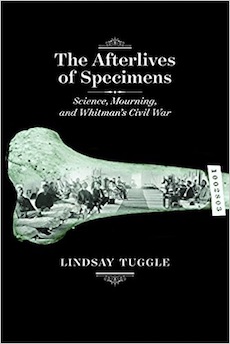Louis J. Kern
Lindsay Tuggle’s penetrating, interdisciplinary analysis of Whitman’s lifelong effort to memorialize the multitude of Civil War dead (752,000—; more than total killed in all other U.S. wars) provides a sensitive reading of the poet’s nursing services and his struggle to assuage his personal and the nation’s mourning. Tuggle traces the cumulative development of Leaves of Grass from its pre-war editions (1855-60), embodying an “ecoerotic” conception of death—corpses regenerated through natural decomposition, through later editions in which the “hecatombs of battle-deaths” (“Good-Bye My Fancy,” 2nd Annex, Leaves of Grass, 1891) threatened to overwhelm nature’s recycling capacities. Whitman’s focus shifted from organic transformation to a poetics of preservation of representative “specimens.”
Thoroughly grounded in primary sources and supplemented by recent psychiatric literary criticism, Afterlives demonstrates how the Civil War radically altered the relationship between the contested terms sentimentality-science, a clean death and intact burial-dissection, and resurrection-embalming as they reflected cultural attitudes towards the body.
Tuggle shows how Whitman’s attitudes towards the bodies of decedents was conditioned by his relationship to popular medical, scientific, and pseudo-scientific movements of his day as were those of American culture at large. Initially repelled by body snatching, medical dissection, autopsies, and embalming, Americans came to accept these practices as contributory to medical advances, resolution of causes of death, and preservation of battlefield casualties for return home.
Whitman knew physicians like John H. Brinton, who gathered specimens for the Army Medical Museum, and Silas Weir Mitchell, who developed the neurological theory of “phantom limbs.” From them he learned that the body might be violently dissevered and yet retain a sense of its wholeness, an insight reinforced by the influence of spiritualism, mesmerism, phrenology, and faradization.
For Tuggle, the word “specimen” carries an etymological connotation of voyeurism that applies to the preserved museum relics, Matthew Brady’s photographs, and the ritualistic display of Lincoln’s embalmed body; but for Whitman both the nature of his collection of individual cases and his poetic rendering of their collective cultural valence sought an inner-directed preservation of bodies rather than their external display.
Specimen Days (1882) offers a memorial to named soldiers and his interaction with them. In Leaves of Grass his “specimens” are anonymous: “unable to find lasting resolution to his anxiety for the unknown and unburied, Whitman incorporates these ‘unfound’ ghosts within the text as surrogate tomb.”
Whitman was haunted by spectral visions wrought by traumatic memories, “in silence in dreams projections / Recurring, returning” (“The Wound Dresser”), “your million unwrit names all, all—you dark bequest from all the war . . .embalm’d with love in this twilight song” (“A Twilight Song”).
Whitman’s health deteriorated during the Civil War, and he suffered successive strokes (1873,1876), attributable to the hypertension and emotional stress of his nursing service, that left him semi-invalided. His death in 1892 of “military tuberculosis” he considered the sacrifice for his “specimens”: “I had to pay much for what I got. . . .I got the boys. . . . I gave myself for them: myself: I got the boys: then I got Leaves of Grass . . . the consummated book.”
Tuggle has given us a powerful reading of how the profound impact of the massive mortality of internecine conflict, its horrors and irreparable loss that effectively revolutionized the rituals and practices surrounding death and the disposition of corpses. She has also provided historical links in the evolution of PTSD in relation to amputation, the most common surgical procedure in both the Civil War and America’s current serial war. This uniquely fascinating work provides a powerful re-reading of the central Whitman oeuvre and the nineteenth-century culture of death.
Louis J. Kern (ΦBK, Clark University,1965) is professor emeritus of history at Hofstra University. Hofstra University is home to the Omega of New York chapter of Phi Beta Kappa.




